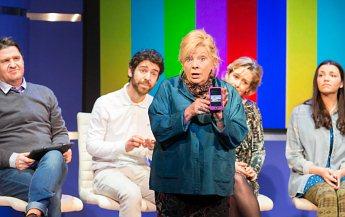In the Republic of Happiness
The annual family Christmas dinner is only days away. What many people look forward to and diligently prepare for weeks can often, as we all know too well, end in floods of tears, or worse. It seems apt then that this new play by Martin Crimp begins with a typical family Christmas, but it is hardly one that the family will remember with affection.
The play is described as 'an entertainment in three parts'. The first section is entitled 'DESTRUCTION OF THE FAMILY', the second is 'The FIVE ESSENTIAL FREEDOMS OF THE INDIVIDUAL' and the last is 'IN THE REPUBLIC OF HAPPINESS'.
Mum and Dad and their two girls Hazel and Debbie, along with Granny and Grandad are half-way through their turkey when we join them at the beginning of the play. But already things have started to sour. Debbie is pregnant, and seems afraid about what the future has in store for her baby. This leads sister Hazel to suggest that Debbie should 'get rid of' her baby if the world isn't 'good enough' for it. Hazel is resentful that Debbie has been bought a car and diamond earrings and we recognise familiar sibling rivalry on display. After a while, Uncle Bob 'suddenly appears' as if by magic. He is about to leave the country with his wife, Madeleine, and Bob has a message for the family, ostensibly from his wife. He says this is the only opportunity for her to tell the family how much she hates and abhors them. All members of the family are subsequently subjected to a bombardment of barbed criticism from Uncle Bob, or rather from Madeleine via Uncle Bob.
This is one of those plays that can be a little maddening and frustrating because it requires us to do some mental contortions to formulate an interpretation. And it is not crystal clear, at least to me, just what Martin Crimp is actually getting at. I suspect he is asking us to consider just what it means to be an individual, and how our individual rights relate to others and to society as a whole. For example, as an individual, do I have the right to trample roughshod over the feelings and emotions of others, just because I feel I have to get something off my chest? I suspect Mr Crimp is also alluding to those people who use social media to say (pretty terrible) things anonymously which they would never dare say in public.
The first part of the play is very funny and enjoyable, but there is less humour in the second part, and by the end it is almost non-existent (and deliberately so, I would think). Dominic Cooke's production is fluid and well-cast. And even if it cannot quite translate the writer's meaning with the clarity one might like, it should provoke enough discussion as to what it really means.
"The Royal Court has a proud tradition of offering alternative Yuletide fare and this year they have surpassed themselves with Dominic Cooke's razor-sharp production of a work that could be described as the ultimate antidote to mindless festive cheer...[it is a] deep, provocative play."
Paul Taylor for The Independent
"Lively and vivid production - a highly entertaining evening."
Aleks Sierz for The Stage
"In Cooke's fluent, stylish production the cast perform this tiresome piece with more wit and conviction than it deserves..clapped out Austin Allegro of a play."
Charles Spencer for The Daily Telegraph
"I admire Crimp's ambition, but his play left me puzzled."
Michael Billington for The Guardian
"The sort of strange and sometimes maddening new play that is guaranteed to divide opinion. It certainly isn't jovial Christmas fare, despite the presence of enjoyable, quirky songs; instead it's a political piece that recalls the angry adventurousness of the Sixties."
Henry Hitchings for Evening Standard
Originally published on
